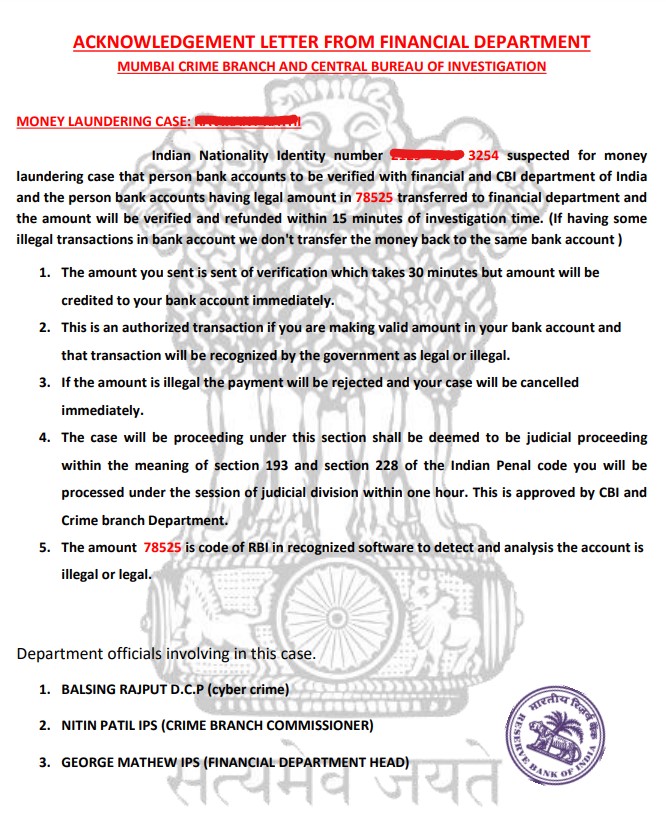Cyber Crime
FedEx Package Scam: How Conmen Pose As Law Enforcement Officers To Steal Money

NEW DELHI: In a harrowing incident this week, a Chennai-based businessman narrowly escaped falling victim to a group of conmen who cunningly impersonated law enforcement officers. These fraudsters pretended to intercept a suspicious FedEx package, falsely claiming it belonged to the businessman’s company and contained illegal drugs.
This unsettling incident comes on the heels of another alarming case involving cyber fraud, where a 34-year-old doctor from Delhi was robbed of a staggering sum of Rs 4.5 crore. The perpetrators of this elaborate scheme posed as officials from various law enforcement agencies, including the Mumbai police, narcotics division, and even DCP-level officers. The deception began with a phone call to the victim, informing her about a supposed “seized” FedEx package that she was allegedly linked to. This incident is believed to be the largest cyber con ever perpetrated on an individual.
ALSO READ: Step By Step Guide: How To File Cybercrime Complaint Online In India
According to the victim’s complaint, she was informed by the fraudsters that a substantial amount of the illicit drug MDMA had been discovered in a FedEx courier associated with her. They accused her of being involved in narco money and coerced her into temporarily surrendering the funds in her accounts until the matter could be resolved.

Sample of fake notice sent by scammers.
The modus operandi of this scam involved the fraudsters contacting their victims, claiming that a suspicious FedEx package had been seized by the Mumbai Police, which allegedly contained MDMA. The unsuspecting victims were then instructed to press “1” for further details. The fraudsters proceeded to inform the victims about the contents of the package, including personal items such as passports, banking documents, shoes, clothes, and a significant quantity of MDMA weighing 140 grams. They also claimed that the victims had already paid Rs 25,025 plus GST as shipping charges through an ICICI credit card.
ALSO READ: Victim Of A Cyber Attack? Now Dial 1930 & 155260 To Register Complaint And Get Your Money Back
The criminals further perpetuated their ruse by initiating Skype calls, during which they impersonated officials from various agencies, including the Andheri police station, RBI officials, Mumbai Police DCPs, customs officials, and narcotics division officers. To solidify their credibility, the scammers even forged government documents and misused the names of several senior officers.
The fraudsters manipulated her into obtaining signatures from her husband, breaking their joint fixed deposits, and transferring the money to them. After a staggering amount of Rs 4.73 crore was transferred, she was instructed to patiently await the clearance report from the RBI to determine the legality of the funds. The victim was explicitly warned against divulging any details to her family members, as they would be treated as accomplices, potentially resulting in the seizure of their accounts.
To further deceive their victims, the fraudsters claimed that the victim’s Aadhaar ID had been permanently blocked, promising to issue her a new one. Additionally, they instructed her to delete all Skype conversations to eliminate any evidence of their illicit activities.

Sample of fake notice sent by scammers.
However, once the victims transferred all their money as instructed, the fraudsters claimed to initiate a verification process for the money trail and its source. They promised the victims that the RBI would restore the funds and issue a clearance certificate once the money was deemed legitimate. Meanwhile, the victims were coerced into deleting all Skype communications. However, after the money was transferred, the criminals vanished, leaving the victims in shock and despair.
ALSO READ: Job Scam: Middle East New Target Of Phishing Scams, Cyber Thugs Pose As UAE Ministry Officials
Step-by-Step Process of How Scammer Gangs Operate in FedEx Package Scams:
Target Identification: Scammer gangs begin by identifying potential targets, usually individuals who are likely to have high-value packages or financial resources. They may gather information through various means, including online research, social media profiling, or data breaches.
Initial Contact: The scammers initiate contact with their targets via phone calls, posing as representatives of FedEx or law enforcement agencies. They may employ sophisticated caller ID spoofing techniques to appear legitimate.
Suspicious Package Seizure: The fraudsters inform the target that a suspicious FedEx package addressed to them has been seized by law enforcement, alleging its involvement in illegal activities such as drug trafficking. This creates a sense of urgency and alarm in the target.
False Contents Description: The scammers provide detailed information about the alleged contents of the package, often mentioning personal items of the target, such as passports, banking documents, or clothing, along with a substantial quantity of drugs like MDMA. They may claim that the target had already paid shipping charges through a credit card.
Impersonation of Law Enforcement Officers: To further deceive the target, the scammers engage in a series of phone calls or even Skype conversations, impersonating various officials. These can include representatives from local police stations, RBI (Reserve Bank of India), DCPs (Deputy Commissioners of Police), customs officers, or narcotics division officers. They may fabricate government documents and misuse the names of senior officers to enhance their credibility.
Coercion and Fear Tactics: The scammers manipulate the target by creating a sense of fear and urgency. They allege that the funds in the target’s bank account are linked to drug money, thereby implicating the target in criminal activity. They convince the target that the only way to resolve the situation is by temporarily handing over the funds to them for verification and investigation purposes.
Money Transfer and Exploitation: Through a series of instructions and manipulative tactics, the scammers coerce the target into transferring significant amounts of money to them. They may request the target to break fixed deposits, transfer funds from joint accounts, or make direct payments to specified accounts under the guise of temporary holding until the matter is resolved.
Secrecy and Intimidation: The scammers impose strict confidentiality on the target, warning them against sharing any information about the ongoing situation with family members or friends. They use intimidation tactics, such as threatening to treat the target’s loved ones as accomplices or seize their accounts, to prevent the target from seeking outside assistance.
False Promises and Vanishing Act: After receiving the transferred funds, the scammers assure the target that they will initiate verification of the money trail and source. They promise that the funds will be restored by the RBI and provide a clearance certificate once the money is deemed legal. However, after making the victim believe their money is being processed, the scammers vanish without a trace, leaving the target devastated and financially drained.
In light of these distressing incidents, FedEx has released a statement cautioning the public against sharing personal information in response to unsolicited phone calls, mail, or emails regarding shipments or packages. The company affirms that they only request such information if initiated by customers and advises anyone who receives suspicious communication to contact their customer service hotline at 1800-22-6161 or 1800-209-6161 for verification.
These scams serve as a stark reminder for individuals to remain vigilant and cautious, especially when receiving unexpected calls or messages involving sensitive information. It is crucial to verify the authenticity of such requests with the relevant authorities before taking any action to prevent falling victim to these malicious schemes.
ALSO READ: Search All India Police Station Phone Numbers & Mail ID Through This Search Engine
Steps to Prevent FedEx Package Scams and Similar Fraudulent Schemes:
Verify Incoming Calls: Be cautious when receiving unsolicited calls, especially from individuals claiming to be from FedEx, law enforcement agencies, or other institutions. Always verify the caller’s identity by independently contacting the official customer service hotline or relevant authorities using trusted contact information.
Guard Personal Information: Avoid sharing sensitive personal information, such as bank account details, credit card numbers, or passport information, over the phone unless you have initiated the call and are certain of the recipient’s legitimacy. Legitimate organizations typically do not request such information unsolicited.
Be Skeptical of Urgent Requests: Scammers often create a sense of urgency to pressure victims into making hasty decisions. If someone claims that a package has been seized or involves illegal activities, remain calm and avoid making any immediate monetary transactions or providing sensitive information until you have independently verified the situation.
Validate Suspicious Packages: If you receive a call regarding a suspicious package, contact FedEx directly using the official customer service hotline or through their verified website. Provide them with the tracking number or other relevant details to confirm the status of the package and verify the legitimacy of any claims made.
Educate Yourself: Stay informed about common scams and fraud techniques employed by criminals. Regularly research and read news articles, official announcements, and resources provided by law enforcement agencies or consumer protection organizations to stay up-to-date with the latest information on scams.
Be Wary of Caller ID Spoofing: Scammers often use caller ID spoofing techniques to make their calls appear legitimate. Therefore, do not solely rely on caller ID to determine the authenticity of a call. Instead, focus on verifying the identity of the caller through other means, such as calling back on a verified contact number.
Practice Online Security: Protect your personal and financial information online by using strong, unique passwords for all accounts, enabling multi-factor authentication when available, regularly updating software and applications, and being cautious of suspicious links or attachments in emails or messages.
Report Suspicious Activity: If you believe you have encountered a scam or fraudulent activity, promptly report it to the appropriate authorities, such as local law enforcement agencies and the cybercrime division. Additionally, inform the courier company involved, such as FedEx, providing them with any relevant information to aid their investigation.
Spread Awareness: Share information about scams and fraudulent schemes with friends, family, and colleagues. Educating others about these scams can help prevent them from becoming victims and contribute to a safer online community.
Trust Your Instincts: If something feels suspicious or too good to be true, trust your instincts and exercise caution. Take the time to thoroughly investigate any claims or requests before taking any action that could compromise your personal or financial security.
Follow The420.in on
Telegram | Facebook | Twitter | LinkedIn | Instagram | YouTube














